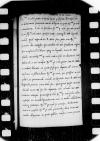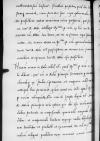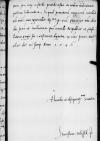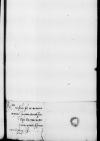 BCz, 1599, p. 715
BCz, 1599, p. 715
Reverendissime in Christo Pater et Domine, domine gratiosissime.
Praemissa mei et deditissimorum servitiorum meorum diligenti in gratiam Reverendissimae Paternitatis Vestrae commendatione.
⌊⌋ et schedam Reverendissimae Paternitatis Vestrae per dominum ⌊cancellarium⌋ illustrissimi domini ⌊ducis Prussiae⌋ accepi sacraeque ⌊regiae maiestati⌋ legendam tradidi. Quid responderit ⌊regia maiestas⌋ sua, puto iam Reverendissimam Paternitatem Vestram diu accepisse, per eundem enim dominum ⌊cancellarium⌋ ⌊⌋ remissum est.
Nunc quoque in legenda sacrae ⌊regiae maiestati⌋ scheda manus Reverendissimae Paternitatis Vestrae eadem fide et devotione satisfactum est a me commissis Reverendissimae Paternitati Vestrae. Quam sua ⌊regia maiestas⌋ et audivit libenter, et grato suscipere dignata est animo vigilantiam et sollicitudinem Reverendissimae Paternitatis Vestrae, quam prae se fert in rem publicam et promovendo commodo et dignitate sacrae regiae maiestatis suae. Respondit praeterea sacra ⌊maiestas sua⌋, cumprimum fuisset nuntiatum aliunde sacrae maiestati suae hos deputatos oratores ad aulam suae maiestatis venturos, antequam pervenissent ⌊⌋ Reverendissimae Paternitatis Vestrae, se hoc idem cogitasse, eos nonnihil privatarum rerum in medium adducturos eademque sententia Reverendissimae Paternitatis Vestrae se armasse, auctoritate tamen et consilio Reverendissimae Paternitatis Vestrae praemonita, dum venerint, cavebit diligentius, ne praeter publica commissa eorum privatis  BCz, 1599, p. 716 auctoritatem suam immisceat, stantibus praesertim, quod diu felix fau hidden by binding⌈[ix fau]ix fau hidden by binding⌉stumque maneat, circa parentms. o reg. e⌈oms. o reg. e⌉s suos regni gubernaculis etc. hidden by binding⌈[etc.]etc. hidden by binding⌉
BCz, 1599, p. 716 auctoritatem suam immisceat, stantibus praesertim, quod diu felix fau hidden by binding⌈[ix fau]ix fau hidden by binding⌉stumque maneat, circa parentms. o reg. e⌈oms. o reg. e⌉s suos regni gubernaculis etc. hidden by binding⌈[etc.]etc. hidden by binding⌉
De profectione autem dominorum oratorum praefatorum, quae sit senten hidden by binding⌈[enten]enten hidden by binding⌉tia suae ⌊regiae maiestatis⌋, intelliget Reverendissima Paternitas Vestra ex litteris suae regiae maiestatis. Veretur enim ⌊maiestas sua⌋ sacra, ne res in ⌊comitia regni⌋ futura renun hidden by binding⌈[renun]renun hidden by binding⌉tiatur, ita tamen utetur ea Reverendissima Paternitas Vestra, quemadmodum [...] hidden by binding⌈[...][...] hidden by binding⌉ sacrae suae regiae maiestatis est praescriptum, ne domini oratores sentiant [...] hidden by binding⌈[...][...] hidden by binding⌉ coniectura et opinione suae regiae maiestatis esse profectam.
Novarum rerum in aula nihil est, quod Reverendissimae Paternitati Vestrae a me scri hidden by binding⌈[scri]scri hidden by binding⌉bi debeat, quae enim in aulam ⌊principum seniorum⌋ geruntur [...] hidden by binding⌈[...][...] hidden by binding⌉ aliundeque ex ⌊Italia⌋, ⌊Germania⌋ et ⌊Ungaria⌋ afferuntur hidden by binding⌈[ur]ur hidden by binding⌉, antequam huc perveniant, gratiam novae rei istic apud Reverendissimam Paternitatem Vestram relinquunt. Hunc unum tamen scriptu dignum est sacram ⌊regiam maiestatem⌋ principem nostrum optime gratia Dei esse incolumem, licet hidden by binding⌈[cet]cet hidden by binding⌉ diebus praeteritis in compescendis quorundam magnatum dissensio hidden by binding⌈[nsio]nsio hidden by binding⌉nibus et componendis limitum negotiis multum desudasse, [...] hidden by binding⌈[...][...] hidden by binding⌉tum tractatus, ut producti et examinati ita ad serenissimi patris hidden by binding⌈[atris]atris hidden by binding⌉ iudicium relegati, paululum nunc recreavit animum venatu hidden by binding⌈[u]u hidden by binding⌉ regia hidden by binding⌈[regia]regia hidden by binding⌉  BCz, 1599, p. 717 ⌊maiestas sua⌋, mox a festis Penthecosten in eodem iudiciorum pistrino laboratura. Si quid privatorum negotiorum curabunt domini oratores, non ignorabit Reverendissima Paternitas Vestra.
BCz, 1599, p. 717 ⌊maiestas sua⌋, mox a festis Penthecosten in eodem iudiciorum pistrino laboratura. Si quid privatorum negotiorum curabunt domini oratores, non ignorabit Reverendissima Paternitas Vestra.
Quam ut Dominus Deus diu sanam et incolumem pro commodo reipublicae et consolatione gregis sui conservare dignetur, ex animo precor.
 BCz, 1599, p. 716 auctoritatem suam immisceat, stantibus praesertim, quod diu felix fau hidden by binding⌈[ix fau]ix fau hidden by binding⌉stumque maneat, circa parentms. o reg. e⌈oms. o reg. e⌉s suos regni gubernaculis etc. hidden by binding⌈[etc.]etc. hidden by binding⌉
BCz, 1599, p. 716 auctoritatem suam immisceat, stantibus praesertim, quod diu felix fau hidden by binding⌈[ix fau]ix fau hidden by binding⌉stumque maneat, circa parentms. o reg. e⌈oms. o reg. e⌉s suos regni gubernaculis etc. hidden by binding⌈[etc.]etc. hidden by binding⌉ BCz, 1599, p. 717
BCz, 1599, p. 717 


